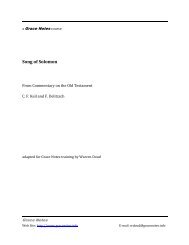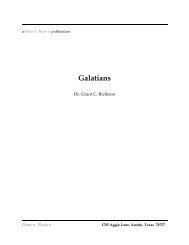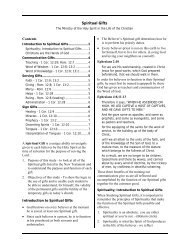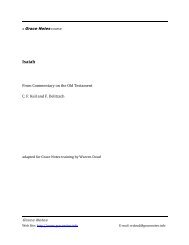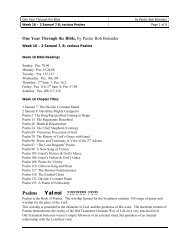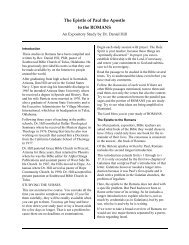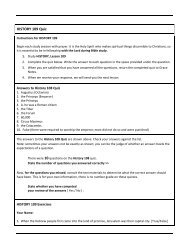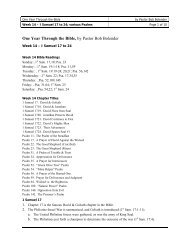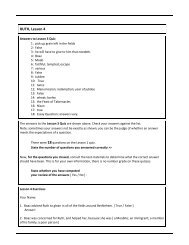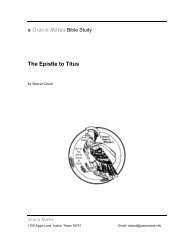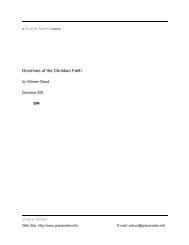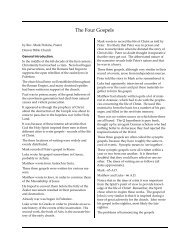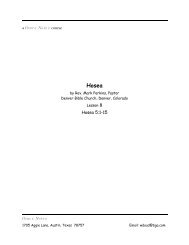<strong>Apostolic</strong> <strong>Fathers</strong> 4attaches to it a wholly orthodox interpretation(much as the Gnostics took apostolic traditionsand without hesitation interpreted them inGnostic fashion). R. M. Grant feels that such apractice points to the time around A.D. 140when such Gnostic teachers as Marcion andValentinus were active in Rome without beingimmediately rejected as heretics. This ispossible, though there is every likelihood thatthis kind of fluidity between “orthodox” and“Gnostic” traditions existed in many times andplaces in the 2nd century.This ancient Christian sermon begins with areflection on the salvation which God hasgranted to the gentile hearers (1:1–4:5). <strong>The</strong>ymust not take lightly either the salvation itselfor Jesus Christ through whom it has come. Hemust be acknowledged as Lord, along with Godthe Father, not only with words but with deedsas well. <strong>The</strong> preacher appeals to Isa. 54:1 and tocertain sayings of Jesus (cf. Mk. 2:17; Lk. 19:10)to make his point that those who were lost arenow saved (2:1–7). It is perhaps significant foran understanding of authority in the secondcenturyChurch that the author appeals toScripture and tradition, and to the OT and “theGospel” (8:5; cf. 2:4) in much the same way. Heconfronts his hearers with the choice betweenthis world and the world to come (5:1–7:6) andcalls them to repentance (8:1–20:5). Thisrepentance is defined as “self-control” (15:1) or“keeping the flesh pure” (8:6). This demand isgrounded in the complicated argument thatChrist (and with Him the Church) was originally“spirit” but became “flesh,” and that in theresurrection the flesh will rise again as it“receives the Spirit” (9:1–5; 14:1–5). Morebroadly and simply, the demand is grounded inthe fear of judgment and hope of the kingdomof God (10:1–12:6; 16:1–3; 17:4–7). Again andagain the preacher renews his call torepentance (8:1f; 13:1; 16:1; 17:1; 19:1), urgingthat if they repent, his hearers will save boththemselves and him their counsellor (15:1; cf.19:1). Like the ancient prophets, he sees hisown fate intertwined with those to whom heministers.III. BarnabasOnce again the title (the Epistle of Barnabas) isa misnomer. Though Clement of Alexandria(e.g., Misc. ii.31.2) and Origen (Contra Celsumi.63) attributed it to Barnabas the companion ofPaul, it is an anonymous work, and Eusebiusclassed it among the “spurious” (HE iii.25.4) orat least “disputed” (vi.13.6; 14.1) bookscirculating in the ancient Church. Yet itsinclusion in the fourth-century Greekmanuscript of the Bible, Codex Sinaiticus,testifies to the great esteem and near-canonicalstatus it enjoyed in some sectors of the Church.In addition it is contained in the Constantinoplemanuscript (see above under First Clement),and in a family of nine Greek manuscripts inwhich Barn 5:7ff is abruptly joined toPolycarp’s Epistle to the Philippians (after 9:2)without a break of any kind. <strong>The</strong>re is also aLatin version, in somewhat abridged form, ofthe first seventeen chapters of Barnabas, aswell as a few Syriac fragments and a number ofquotations by Clement of Alexandria.<strong>The</strong> date of this work cannot be establishedwith any certainty. A statement in 16:4indicates that the Jerusalem temple is in ruins,thus supporting a date between A.D. 70 and 135,but attempts to be more specific are onlyconjectures. <strong>The</strong> reference in 4:4 to the tenkingdoms of Dnl. 7:24 is simply traditionalapocalyptic language and should probably notto be made the basis for any conclusions aboutthe epistle’s date.Though it cannot be proved that Barnabas thecompanion of Paul did not write this book,neither the range of possible dates nor thenature of the document itself makes thetradition that he did very plausible. <strong>The</strong> authoris apparently writing to Gentiles who have beensaved out of darkness and idolatry (14:5–8;16:7), and he claims to write as one of theirown (1:8; 4:6). <strong>The</strong> most obvious affinities ofBarnabas are with Alexandrian Christianity, asevidenced on the one side by similarities in itsOT exegesis with Philo, and on the other by theacquaintance with Barnabas shown by Clementand Origen. Barnabas is more likely the work ofa gentile Christian of Alexandria in the early2nd cent than of the Jewish Christian fromCyprus mentioned in the book of Acts.
<strong>Apostolic</strong> <strong>Fathers</strong> 5<strong>The</strong> introduction (1:1–2:3) is rather generaland gives only a slight indication of what is tofollow. <strong>The</strong> author presents himself as onewhose task it is to impart perfect knowledge tohis readers (1:5), not as a teacher (which heapparently is), but as a father to the children heloves. This knowledge has to do with the past,the present, and the future (1:7; cf. 5:3). <strong>The</strong>knowledge about the future turns out to beconventional eschatological teaching (e.g., ch4); the knowledge of past and present, whichcomprises most of the epistle, turns out to be aseries of allegorical interpretations of the OT.In the ancient prophetic tradition, the authormakes it clear that God does not desireceremonial fasts and sacrifices, but justice andmercy (2:4–3:6). <strong>The</strong> readers are called on tobe ready for the eschatological crisis and not tobe lured into the false security that deceivedthe Jews under the old covenant (4:1–14). Heunderscores the greatness of the Christiancalling by a discussion of the work of Christ,who suffered to prepare a new people and tobring to completion the sins of the old Israel. Heillustrates many aspects of Jesus’ career byquotations and allegorical interpretations of OTpassages (5:1–8:7). Especially elaborate is hisexegesis of Gen. 1:26, 28 and Ex. 33:1, 3 (6:8–19), of the ritual of the Day of Atonement (7:3–11) and of the red heifer ritual of Nu. 19:1–10(8:1–7). <strong>The</strong>n he offers “spiritual”interpretations of such Jewish institutions ascircumcision and the various Mosaic food laws(9:1–10:12). His procedure is to reinterpretceremonial rules as moral and ethicalexhortations. Even though he employs theseinterpretative principles in the framework of apolemic against the Judaism of his day, theauthor of Barnabas had ample precedent for hissometimes fanciful exegesis within Judaismitself (notably Philo and the Letter of Aristeas).Turning his attention to what is distinctlyChristian, “Barnabas” finds many subtleintimations in the OT of the water of baptism,the wood and the shape of the cross, and eventhe name and person of Jesus Himself (11:1–12:11). Here Barnabas exhibits several of thesame interpretative traditions which show upin more detail in the writings of Justin Martyr.<strong>The</strong> heart of the Epistle of Barnabas is thecontrast between the old covenant and the new,with the assertion that God’s true covenantbelongs not to the Jews but to the Christians(13:1–14:9). Correspondingly the ancientsabbath has given way to the Christian “eighthday,” or Sunday, in which Jesus rose from thedead (15:1–9), just as the physical temple inJerusalem has been replaced by the spiritualtemple, the Christian community where Godhas made his dwelling (16:1–10). Chapter 17reads like a conclusion; though there is more hecould write about present and future (cf. 1:7;5:3), it is “hidden in parables” and he judgesthat what he has said is sufficient (17:2).<strong>The</strong>re is thus a definite break at the end of ch17 and in fact the Latin version ends at thispoint. But the Greek manuscripts make a newbeginning with the words, “But let us move onto other knowledge and teaching” (18:1). Thisbegins the famous “Two Ways” section ofBarnabas (18:1–21:9), which is paralleled inDid 1:1–6:2. <strong>The</strong> way of light (ch 19) is underthe rule of God through his angels, while theway of darkness (ch 20) belongs to the angelsof Satan (18:1f). This “Two Ways” teaching is byno means profound or “hidden in parables,” butsounds more like elementary instruction fornew converts (which is exactly how it functionsin the Didache). Older commentators argued forliterary dependence of Barnabas on theDidache or of the Didache on Barnabas, but themore recent tendency has been to favor thedependence of both on a common primitivesource. <strong>The</strong>re are, for example, close parallelsbetween the “Two Ways” tradition and theQumrân Manual of Discipline (1QS 3:18ff). It issurprising to find in such an anti-Jewishdocument as Barnabas a section like this inwhich there is little or nothing that isdistinctively Christian, but in which all that issaid can function appropriately in either aChristian or a Jewish setting. <strong>The</strong> mostplausible explanation is that Barnabas comesfrom a gentile Christian community in whichthe basic instruction given to new convertsfrom idolatry and paganism necessarily focusedas much on general moral principles and thingswhich Christianity inherited from Judaism as itdid on the distinctively new Christian messageof the cross. New converts needed to be taught



